Week ending 11 July 2020
REGIONAL OVERVIEW
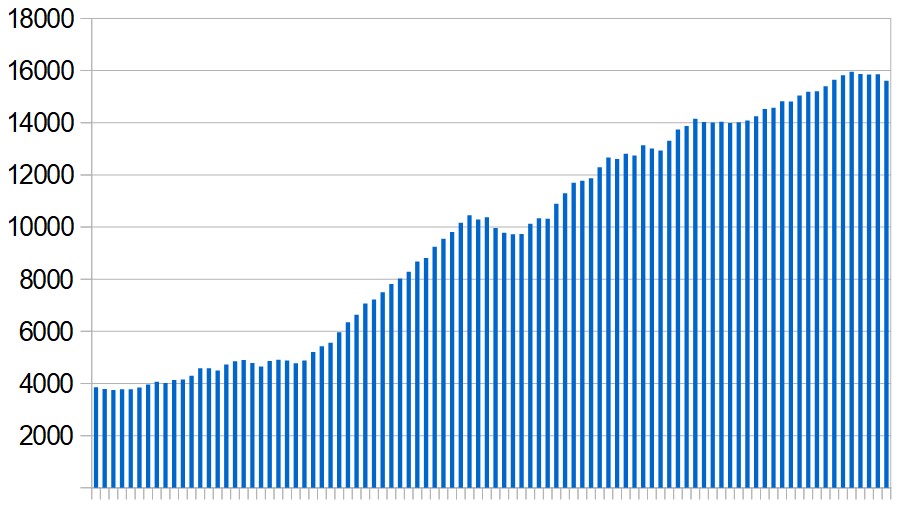 |
More than a million people in the Middle East and North Africa have now been infected with the Covid-19 coronavirus according to official figures, though many more cases have probably gone undetected. Among the 20 countries monitored, the total of new infections recorded during the past week has averaged almost 16,000 a day.
Most governments in the region took preventive action at an early stage, which has probably helped to keep the overall figures lower than in some other parts of the world. However, there are huge differences within the region. While Jordan and Tunisia have virtually eleminated local transmission of the virus, in some of the other countries it is spreading more rapidly than ever.
The situation in Israel and Palestine is particularly alarming, though Algeria, Iraq and Oman have also seen substantial increases over the past week. Some of that is due to the lifting of lockdown restrictions but there are also frequent complaints about members of the public failing to observe basic precautions such as wearing face masks or flouting the rules for quarantine and self-isolation.
Three countries are showing signs of improvement. Egypt, Qatar and Saudi Arabia all reported significantly fewer cases this week compared with the week before.
Four countries in the region – Yemen, Sudan, Iraq and Libya – are especially ill-equipped to cope with their epidemics.
Detailed statistics for the region, based on official figures, can be found in this spreadsheet.
Previous situation reports: July 4; June 27; June 20.
ALGERIA
Algeria has recorded a relatively small number of cases – 416 per million inhabitants – but testing capacity is also low. New infections began increasing in mid-June as lockdown restrictions were eased, and they continue to grow. During the past week new cases averaged 453 a day – more than four times the level of a month ago.
Healthcare workers account for about 10% of all known cases – 1,700 have been infected since the outbreak began. Some of Algeria's hospitals are reported to be full and not accepting new patients.
For more details see: Covid-19 in Algeria
Confirmed cases: 18,242
New cases in past week: 3,172
Active cases: 4,122
Deaths: 996
Tests carried out: (unknown)
BAHRAIN
The past week has brought no significant change and there's no sign so far that Bahrain's epidemic is subsiding. Of 610 new cases reported on Thursday, 339 (56%) were expatriate workers. This broadly reflects the country's population balance between citizens and expatriates.
For more details see: Covid-19 in Bahrain
Confirmed cases: 32,039
New cases in past week: 3,629
Active cases: 4,722
Deaths: 104
Tests carried out: 650,000
EGYPT
New infections in Egypt reached a plateau in mid-June and the numbers are now falling. During the past week newly-reported cases averaged 1,075 a day – a drop of almost 30% since two weeks ago.
Egypt's strategy is to minimise economic damage by "coexisting" with the virus until a vaccine comes along. The night curfew which had been in force since March ended on June 27 and cafes and restaurants were allowed to reopen, though with some restrictions. The authorities have been especially keen to revive the important tourism industry and Egypt's airports reopened for international flights on July 1.
Assuming the official figures are reliable, lifting restrictions doesn't seem to have had an adverse effect – though it's too early to be sure.
The Sisi regime is waging what Amnesty International describes as a "campaign of harassment and intimidation" against healthcare workers and others who question or criticise its handling of the situation. More than 70 people, including doctors, journalists and lawyers, have been arrested for expressing their views. In June, prime minister Mostafa Madbouly suggested that the spread of the virus was due to "negligence and mismanagement" by doctors.
For more details see: Covid-19 in Egypt
Confirmed cases: 80,235
New cases in past week: 7,524
Active cases: 53,259
Deaths: 3,702
Tests carried out: 135,000
IRAN
Iran was the first country in the region to be seriously affected by the virus and has since been hit by a second wave. Government figures show an initial wave of infections which peaked at the end of March. It subsided during April, briefly dipping below 1,000 new cases per day but then rose to a new peak in the first week of June.
New infections have dropped back a bit since then but the official numbers have not changed substantially during the last three weeks, averaging about 2,500 cases a day.
Iran continues to report more coronavirus-related deaths than any other country in the region. Officially-recorded deaths during the past week have averaged 192 a day – which is higher than at any other time since Iran's outbreak began.
Confirmed cases: 252,720
New cases in past week: 17,291
Active cases: 25,258
Deaths: 12,447
Tests carried out: 1.9 million
IRAQ
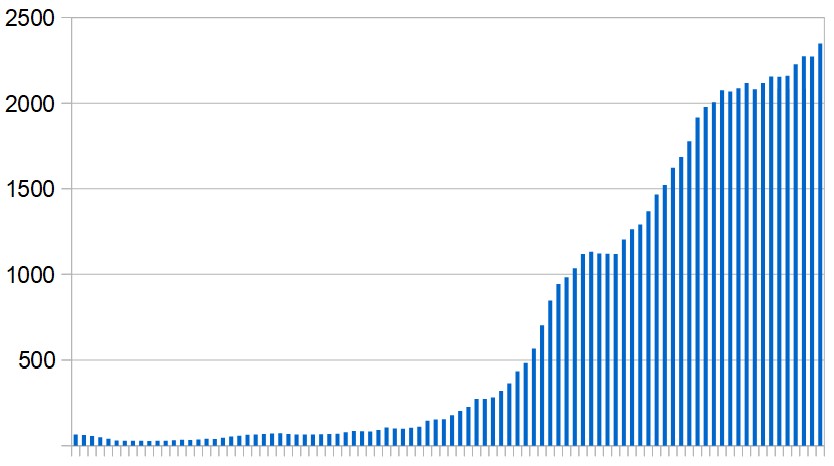 |
Iraq has seen steep rises since early June. Newly-recorded infections currently average about 2,300 a day – the highest level since the outbreak began – and Iraq's official figures are widely believed to understate the scale of the epidemic. Many cases go unreported because of social stigma. Compliance with preventive measures appears to be low and health services are inadequate.
Amid this worsening situation, the authorities announced on Friday that Iraqi citizens can now travel abroad. They will be tested for Covid-19 on their return. Those who test negative must self-quarantine for 14 days while those who test positive will be hospitalised.
For more details see: Covid-19 in Iraq
Confirmed cases: 72,460
New cases in past week: 16,440
Active cases: 28,120
Deaths: 2,960
Tests carried out: 661,000
ISRAEL
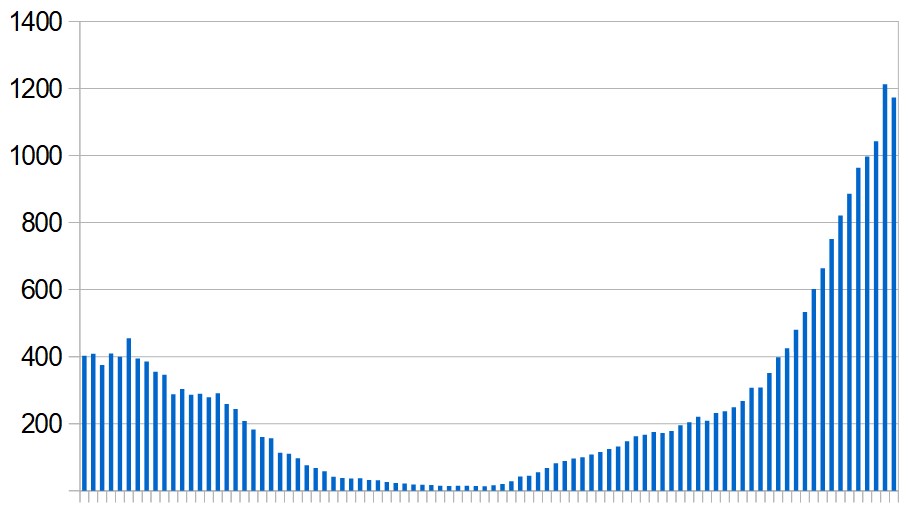 |
The first wave of Israel's epidemic peaked at around 600 new cases a day in early April. Efforts to control it were intially successful and by the second half of May new cases had dropped to about 15 a day.
However, the virus surged back when lockdown restrictions were lifted and the country is now in the midst of a second wave which is much larger than the first. During the past week new cases have averaged almost 1,200 a day – double the number at the peak of the first wave.
The government is reluctant to impose a second nationwide lockdown but may soon be forced to do so in order to avoid overwhelming the health services. Currently, it is trying to focus on declaring "restricted zones" in particular hotspots. There is resistance to these localised lockdowns from haredi (ultra-Orthodox) Jews who claim their rights are being violated.
On Friday, police said they had broken up a party attended by hundreds of teenagers in Ben Shemen forest. The organisers were arrested and dozens of participants were issued with fines for not wearing masks.
For more details see: Covid-19 in Israel
Confirmed cases: 36,266
New cases in past week: 8,211
Active cases: 17,302
Deaths: 351
Tests carried out: 1.2 million
JORDAN
Jordan has been one of the most successful Arab countries in controlling the virus. A few new cases are still being recorded but almost all of them are among people who were quarantined after arriving from other countries.
For more details see: Covid-19 in Jordan
Confirmed cases: 1,173
New cases in past week: 26
Active cases: 177
Deaths: 10
Tests carried out: 455,000
KUWAIT
Kuwait appears to be over the worst. New infections peaked around May 25 and then dropped back substantially, though there has since been a modest rise. The level of new cases is relatively stable, around 700 a day during the past week.
Migrant workers who often live in overcrowded conditions account for the majority of confirmed cases and many have now returned to their country of origin.
For more details see: Covid-19 in Kuwait
Confirmed cases: 53,580
New cases in past week: 4,908
Active cases: 9,983
Deaths: 383
Tests carried out: 427,000
LEBANON
In the midst of political and economic chaos Lebanon is fortunate in having a relatively small number of cases so far. The situation is not under control, though. Lebanon reported 65 new cases on Thursday and 71 on Friday – the highest daily figures since the outbreak began.
For more details see: Covid-19 in Lebanon
Confirmed cases: 2,082
New cases in past week: 252
Active cases: 644
Deaths: 36
Tests carried out: 165,000
LIBYA
Libya is in its ninth year of internal conflict. The UN-backed Government of National Unity in Tripoli is challenged by Field Marshall Haftar's forces based in the east of the country. There are also numerous militias.
This leaves the country ill-equipped to cope with a major epidemic. Growing levels of insecurity, political fragmentation and weak governance have led to a deterioration of basic services, particularly in the health system. At least 27 health facilities have been damaged or closed by fighting and some have been attacked directly. The number of confirmed infections is still small but testing is very limited. There are 870,000 people – refugees, asylum seekers and displaced persons – who the UN regards as especially vulnerable.
According to the WHO, most Covid-19 cases are centred around Sebha, an oasis city 400 miles south of Tripoli. Sebha is close to the borders with Niger, Chad and Algeria, and is a major hub on the migration route from Africa to Europe. It currently hosts about 40,000 migrants. A Swiss-based organisation, REACH, has issued a detailed report on the situation there.
For more details see: Covid-19 in Libya
Confirmed cases: 1,342
New cases in past week: 424
Active cases: 997
Deaths: 38
Tests carried out: 34,000
MOROCCO
Morocco seemed to be making good progress until recently. A strict lockdown had kept the total of known Covid-19 cases below 10,000 and by early June new infections had fallen to around 40 a day. However, there was a major setback towards the end of June with the discovery of hundreds of new cases in the Kenitra area, most notably among women from rural villages employed to pack strawberries (see report). Since then, new cases have not dropped back to previous levels and workplace infections seem to be causing serious problems. Last weekend a major outbreak was discovered at a fish-canning factory in the coastal town of Safi.
New cases currently average around 300 a day – the highest level since the outbreak began.
For more details see: Covid-19 in Morocco
Confirmed cases: 15,328
New cases in past week: 2,040
Active cases: 3,258
Deaths: 243
Tests carried out: 850,000
OMAN
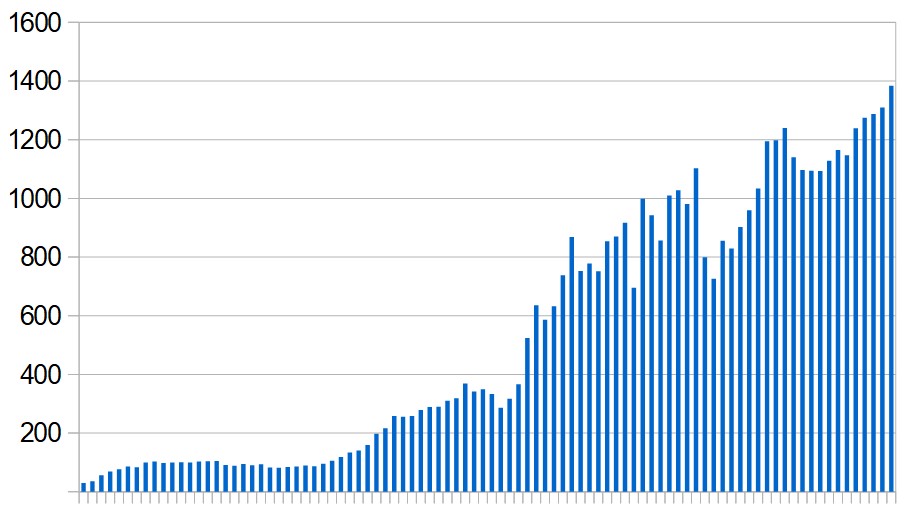 |
Oman has so far recorded almost 54,000 cases – 63% of them during the past month. Previously, most of the new infections were occurring among foreigners – predominantly migrant workers from poor countries. That has now changed and the majority of new cases are Omani citizens. The health ministry blames "continued indifference" by the public, saying that "most of the infections among citizens could have been easily avoided".
There also appears to be a problem with employers failing to report suspected cases among their workforce – presumably to avoid disruption of their business – and the authorities are now threatening to carry out spot checks, with additional penalties for violations, including fines of $295 for not wearing face masks in workplaces.
Oman, with a five-million population, currently has almost 18,000 active cases and health services are coming under pressure. They are said to be coping at present but in the expectation of further increases plans were announced last week for a new field hospital with 250-300 beds.
For more details see: Covid-19 in Oman
Confirmed cases: 53,614
New cases in past week: 9,685
Active cases: 19,145
Deaths: 244
Tests carried out: 231,000
PALESTINE
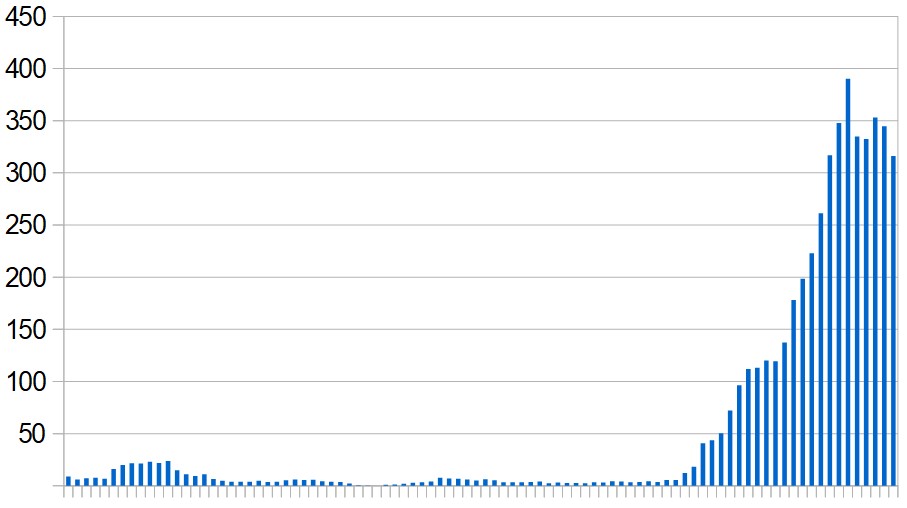 |
Palestine, like Israel, is in the midst of a wave of new infections. More than 6,000 cases have been recorded since the outbreak began – half of them during the last ten days. Hebron is the most seriously affected area, accounting for 69% of all confirmed cases.
On a more positive note, the level of new infections – averaging 316 a day during the past week – has not changed significantly since the previous week.
Many of the recent infections are attributed to people ignoring the rules for social distancing, which the authorities have difficulty enforcing. The health ministry says more than 30% of cases are the result of Palestinians travelling to and from work in Israel where new cases are also increasing.
Fears of a major epidemic in Gaza have not materialised. Most of the known cases there are apparently due to contacts with Egypt.
For more details see: Covid-19 in Palestine
Confirmed cases: 6,225 (West Bank 5,183, Gaza 72, East Jerusalem 970)
New cases in past week: 2,212
Active cases: 5,485
Deaths: 32
Tests carried out: 123,000
QATAR
In population terms Qatar has more known cases than any other country – 36,500 per million inhabitants. Migrant workers have been disproportionately affected. Qatar's epidemic reached a peak in the first week of June and new cases have fallen steadily since then. During the past week new cases averaged 568 a day, compared with more than 1,800 a day at the peak.
For more details see: Covid-19 in Qatar
Confirmed cases: 102,630
New cases in past week: 3,977
Active cases: 4,251
Deaths: 146
Tests carried out: 405,000
SAUDI ARABIA
Saudi Arabia has the largest number of recorded cases among the Arab countries. New infections reached an initial peak in the fourth week of May, then dropped back slightly before rising to a higher peak in the third week of June. During the past week new cases averaged 3,526 a day – about 900 below the June peak.
Migrant workers have been disproportionately affected but the authorities have also complained about non-compliance with precautionary measures by Saudi citizens.
This week the authorities announced a series of precautions for the Hajj (the annual pilgrimage to Mecca) which is due to start on July 28 and normally attracts millions of Muslims from around the world. It will be restricted to about 1,000 participants who are already living in the kingdom and they will be quarantined both before and after the event.
Touching the Kaaba will be forbidden, and pilgrims must wear masks and stay at least 1.5 metres apart. It's also reported that holy water from the Zamzam well will be pre-bottled and sterilised pebbles will be provided for the ritual stoning of the devil.
A number of healthcare workers have been invited to take part in the Hajj in recognition for their efforts during the epidemic.
For more details see: Covid-19 in Saudi Arabia
Confirmed cases: 226,486
New cases in past week: 24,685
Active cases: 61,309
Deaths: 2,151
Tests carried out: 2.2 million
SUDAN
Officially-recorded cases peaked at almost 1,000 a day towards the end of May but have been down to double figures for most of the last two weeks. It's doubtful whether this reflects the true situation on the ground.
The coronavirus struck Sudan in the midst of a political transition following a popular uprising against the regime of President Bashir and the country is ill-equipped to cope with a major epidemic. Testing is very limited and official figures don't reflect the full scale of the outbreak. Most cases are said to be in and around the capital, Khartoum, but there's also concern about the Darfur area where large numbers of deaths have been reported, apparently caused by Covid-19.
The OCHA has previously reported on the deterioration in Sudan’s health care system which was already "under extreme stress" before the arrival of Covid-19. It said 81% of the population have no access to a functional health centre within two hours' walk from their home. Some existing facilities have been closed due to virus outbreaks or lack of medical staff.
For more details see: Covid-19 in Sudan
Confirmed cases: 10,204
New cases in past week: 577
Active cases: 4,278
Deaths: 649
Tests carried out: 401
SYRIA
The Assad regime has reported fewer than 400 cases since the outbreak began, with half of them detected during the past three weeks. Official announcements of new cases rarely give any details.
Fears have been raised about north-western and north-eastern parts of the country which are outside the regime's control. Millions of displaced people are living in those areas and health services are often rudimentary. The first case in the north-west was reported this week – a doctor working at a hospital in Idlib. The WHO says the hospital has been closed and efforts are under way to trace the doctor's contacts. Five cases were previously diagnosed in the north-east.
For more details see: Covid-19 in Syria
Confirmed cases: 394
New cases in past week: 66
Active cases: 252
Deaths: 16
Tests carried out: (unknown)
TUNISIA
There is currently little or no transmission of the virus inside Tunisia. The daily average of new cases has been in single figures since early May.
For more details see: Covid-19 in Tunisia
Confirmed cases: 1,240
New cases in past week: 59
Active cases: 123
Deaths: 50
Tests carried out: 76,000
UNITED ARAB EMIRATES
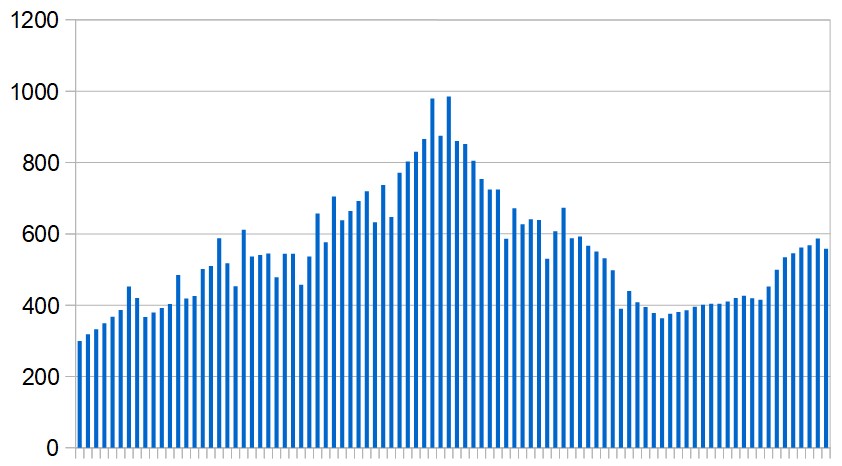 |
The UAE's epidemic peaked in the last week of May when new cases were running at more than 900 a day. New cases dropped below 400 a day towards the end of June but have since risen again. The average during the past week has been 587 a day.
For more details see: Covid-19 in the UAE
Confirmed cases: 54,050
New cases in past week: 3,909
Active cases: 9,751
Deaths: 330
Tests carried out: 3.8 million
YEMEN
Official figures from Yemen are not credible. The evidence from unofficial sources is that many Covid-19 infections and related deaths are not being recorded.
Because of the ongoing war, Yemen already faced a humanitarian crisis before the coronavirus arrived. Millions are malnourished and vulnerable to disease, and health services are inadequate. Official figures do not reflect the severity of the epidemic. Unusually large numbers of deaths are reported, many of them from symptoms resembling Covid-19 and hospitals often refuse treatment if coronavirus is suspected. The Houthis, who control the capital, Sanaa, and much of the north, have a policy of not reporting cases so as to avoid lowering morale and distracting from their war effort.
For more details see: Covid-19 in Yemen
Confirmed cases: 1,384
New cases in past week: 140
Active cases: 386
Deaths: 365
Tests carried out: 120

 RSS Feed
RSS Feed
